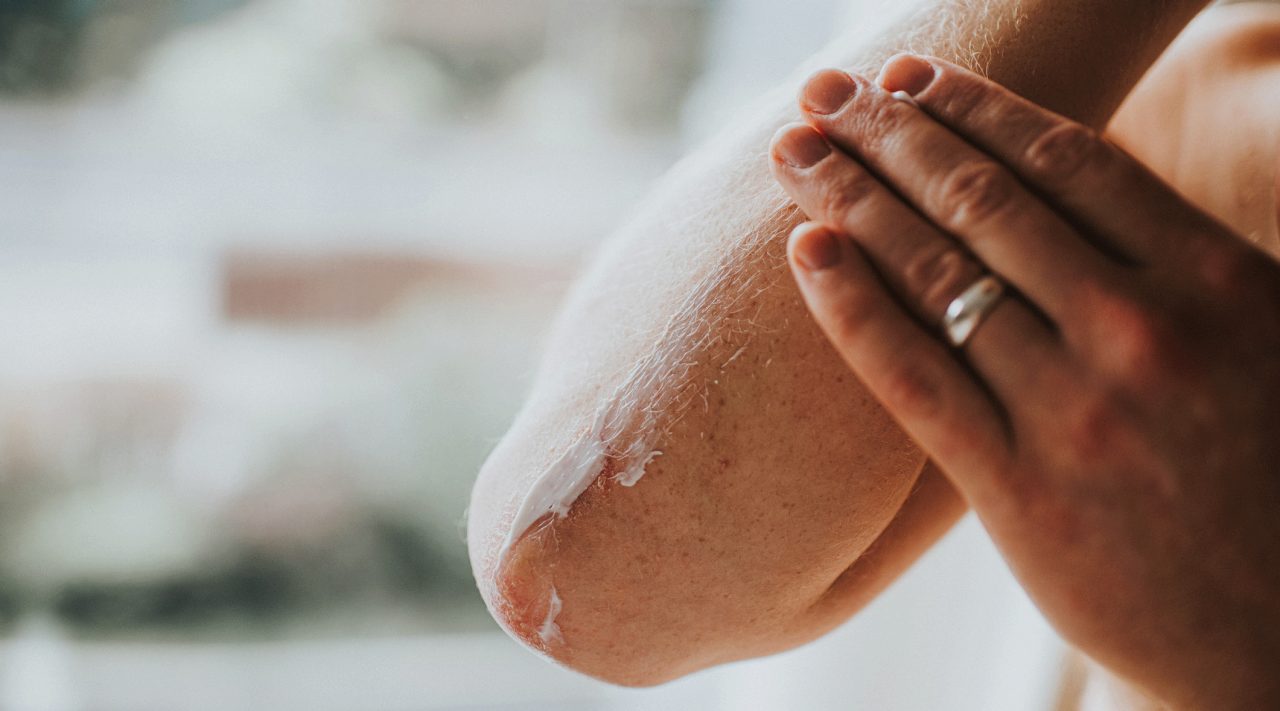A New, Better Psoriasis Drug May Be Coming

If you have this unpleasant skin condition, a new drug that attacks psoriasis may banish your symptoms.
Psoriasis is unpleasant. But there is good news. You’re now more likely to be able to banish your symptoms with a new biologic drug that is injected monthly.
What is psoriasis?
If you have psoriasis, a common chronic disease with no cure, your immune system attacks healthy skin cells. The condition tends to have cycles, flaring for a few weeks or months, then subsiding or entering remission. Psoriasis isn’t cancer — but it does cause skin cells to accumulate up to 10 times faster than normal. The cells pile up and form white scales. This happens most often on your elbows, knees, and scalp — and sometimes psoriasis also affects your nails or joints.
Strep or other infections, or skin injuries like a sunburn, insect bite, or cut, may trigger an outbreak.
YOU MIGHT ALSO LIKE: What Is Psoriatic Arthritis?
How do you treat psoriasis?
Doctors advise starting with the mildest treatment that might help you, depending on your type of psoriasis and how much of your body it covers. Biologics, which target and can prevent a specific reaction in your body, are for use in only moderate-to-severe cases, or if other treatments haven’t helped.
The investigational drug, bimekizumab, made the condition go away completely for 67 percent of patients after 48 weeks of treatment — compared with 46 percent for patients receiving an already approved drug, secukinumab (Cosentyx). In another clinical trial, 86 percent of patients on bimekizumab had a 90 percent reduction in their psoriasis after 16 weeks, compared to 47 percent on a drug called adalimumab (Humira).
What’s the difference? The other drugs block the pro-inflammatory biochemical IL-17A, the most potent form of interleukin-17. The new drug blocks that chemical plus IL-17F, a similar chemical that is more abundant in the body.
Bimekizumab also treats psoriatic arthritis, which affects about a third of psoriasis patients. The downside: in the 48-week trial, nearly 20 percent of the volunteers got thrush, a yeast infection in the mouth, which was treated with a common anti-fungal drug. The volunteers also experienced diarrhea. However, it’s possible that, like other drugs that block interleukin-17, bimekizumab may increase the risk of other infections and cancer.
What are your alternatives?
Biologics include etanercept (Enbrel), infliximab (Remicade), ustekinumab (Stelara), and ixekizumab (Taltz), along with secukinumab (Cosentyx) and adalimumab (Humira). These types of drugs are expensive and are not always covered by insurance.
If you’re considering an injection, you’ve already tried some of the many other treatments available. The most frequently prescribed medications are corticosteroids available as ointments, creams, lotions, gels, foams, sprays, and shampoos. You might apply a corticosteroid once a day during flares, and on alternate days or weekends only when you don’t have symptoms.
The trouble is that these treatments can stop working over time. Other topical options include forms of vitamin D, which slow the growth of skin cells, and retinoids, calcineurin inhibitors, salicylic acid, or coal tar (for the scalp).
Other ways to treat psoriasis:
- Light therapy can be used alone or with other medications. You’ll need repeat treatments, but you might be able to do them at home. You might even rely on sunlight, on a schedule.
- In a treatment known as PUVA, you take a light-sensitizing drug called psoralem before exposure to UVA light. But there are both short-term and long-term side effects (burning, itching, nausea, eye damage, skin aging, and skin cancer.
- Your doctor might offer you oral drugs that suppress the immune system.
- Losing weight and exercise can help as well.
The National Psoriasis Foundation has more information about psoriasis.
Updated:
October 19, 2021
Reviewed By:
Janet O’Dell, RN